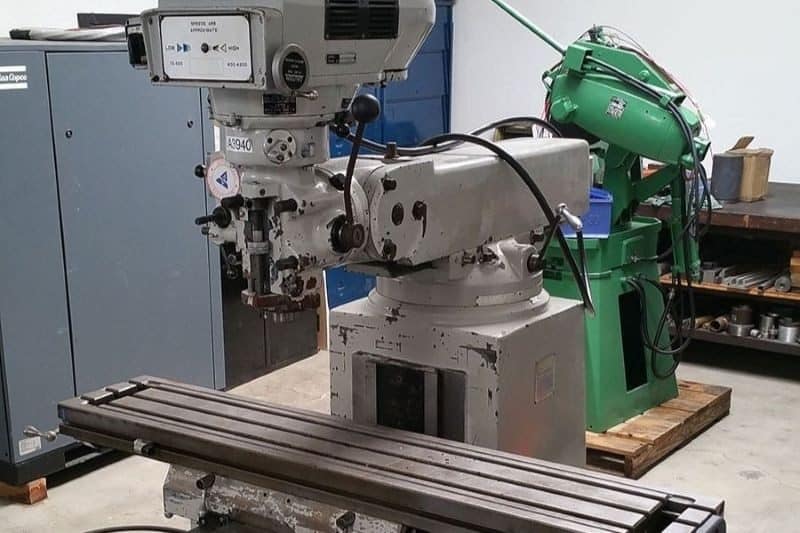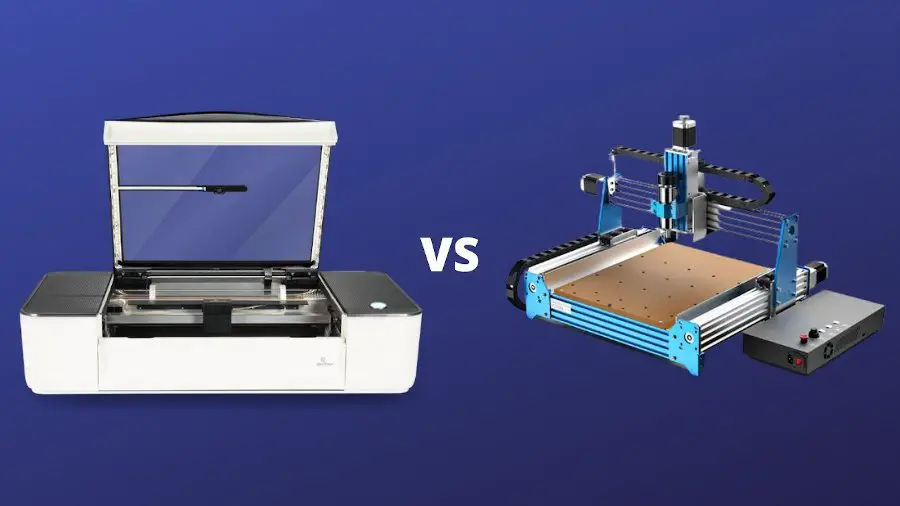Table of Contents
CNC machines have become an essential tool in the manufacturing industry, allowing for precise and efficient production of various parts and components. As businesses consider investing in this technology, one important question that arises is, “How much does a CNC machine weigh?”
The weight of a CNC machine varies depending on its size, type, and components. Smaller desktop machines may weigh around 200 pounds, while larger industrial machines can weigh over 20,000 pounds. It is crucial to consider the weight of a CNC machine when planning its installation and transportation to ensure safety and proper handling. In this article, we will explore the factors that influence the weight of a CNC machine and provide insights for businesses looking to invest in this technology.
The weight of a CNC machine can vary greatly depending on its size, type, and components. Small desktop CNC machines can weigh as little as 100 pounds, while large industrial machines can weigh well over 20,000 pounds. On average, a mid-sized CNC machine weighs around 3,000 pounds. It is important to consider the weight of a CNC machine when planning its installation and transportation.
How Much Does a CNC Machine Weigh?
CNC machines are an essential part of modern manufacturing, used to create everything from car parts to surgical implants. These machines are complex devices that use computer-controlled cutting tools to shape and form materials into precise shapes and sizes. One important consideration when working with CNC machines is their weight. In this article, we will answer the question, “How much does a CNC machine weigh?”.
Factors that Affect the Weight of a CNC Machine
The weight of a CNC machine can vary depending on several factors, including the size and type of machine, the materials used in its construction, and the location of the machine. The following paragraphs will discuss these factors in more detail.
The size and type of machine are perhaps the most significant factors in determining its weight. Smaller CNC machines designed for home use or hobbyists generally weigh between 100 and 500 pounds, while larger industrial machines can weigh over 10,000 pounds. The type of machine can also affect its weight, as some machines are designed for specific uses, such as milling or turning.
The materials used in the construction of a CNC machine can also affect its weight. Machines made from heavier materials like steel or cast iron will generally weigh more than those made from lighter materials like aluminum or carbon fiber. Additionally, the location of the machine can influence its weight, as machines mounted on a stand or table will weigh more than those that sit directly on the floor.
Typical Weight Ranges for CNC Machines
As we mentioned earlier, the weight of a CNC machine can vary significantly depending on the factors we discussed above. However, there are some typical weight ranges for different types of CNC machines. The following paragraphs will provide more information on these ranges.
Small CNC machines, such as those designed for home use or hobbyists, typically weigh between 100 and 500 pounds. These machines are generally designed to be portable and can be moved easily by a single person. They are also less expensive than larger industrial machines, making them a popular choice for hobbyists and small businesses.
Mid-sized CNC machines, designed for use in small to medium-sized businesses, generally weigh between 2,000 and 5,000 pounds. These machines are larger and more complex than those designed for hobbyists but are still small enough to fit in a standard workspace. They are also more expensive than smaller machines but offer greater precision and versatility.
Large industrial CNC machines, used in large manufacturing facilities, can weigh over 10,000 pounds. These machines are massive and require specialized equipment to move and install. They are also the most expensive type of CNC machine but offer the highest level of precision and control.
Benefits of Different CNC Machine Weights
The weight of a CNC machine can have several benefits depending on the type of machine and its intended use. The following paragraphs will discuss some of these benefits.
Small CNC machines are lightweight and portable, making them ideal for hobbyists and small businesses that need to move the machine frequently. They are also less expensive than larger machines, making them a more affordable option for those just starting in the industry. However, they may not offer the same level of precision and control as larger machines.
Mid-sized CNC machines offer greater precision and control than smaller machines while still being small enough to fit in a standard workspace. They are also more durable and can handle larger and more complex projects than smaller machines. However, they are more expensive than smaller machines and may require specialized equipment to move and install.
Large industrial CNC machines offer the highest level of precision and control and can handle the most complex and demanding projects. They are also extremely durable and can last for decades with proper maintenance. However, they are the most expensive type of CNC machine and require specialized equipment and facilities to install and operate.
CNC Machine Weight vs. Performance
The weight of a CNC machine can also affect its performance in several ways. The following paragraphs will discuss some of these factors.
Heavier machines are generally more stable and less prone to vibration than lighter machines. This stability can lead to greater precision and control in the cutting process, resulting in higher quality finished products. However, heavier machines may also be slower and less maneuverable than lighter machines, which can affect productivity.
Lighter machines are generally faster and more maneuverable than heavier machines. This speed and maneuverability can increase productivity and allow for more complex projects to be completed in less time. However, lighter machines may also be less stable and more prone to vibration, which can affect the quality of the finished product.
CNC Machine Weight and Transportation
Transporting a CNC machine can be a significant challenge, especially for larger machines. The weight of the machine can affect the cost and logistics of transportation. The following paragraphs will discuss some of these factors.
Smaller CNC machines are generally easy to transport and can be moved by a single person or in a standard vehicle. However, larger machines may require specialized equipment and vehicles to move safely and efficiently. The weight of the machine can also affect the cost of transportation, as heavier machines may require more time and effort to move.
Conclusion:
In conclusion, the weight of a CNC machine can vary significantly depending on several factors, including its size, type, and construction materials. Small hobbyist machines generally weigh between 100 and 500 pounds, while large industrial machines can weigh over 10,000 pounds. The weight of the machine can also affect its performance, transportation, and cost. Understanding the weight of a CNC machine is an important consideration for anyone working with these complex devices.
Frequently Asked Questions
Here are some of the most frequently asked questions about the weight of CNC machines.
How much does a CNC machine weigh on average?
The weight of a CNC machine can vary greatly depending on the type and size of the machine. On average, a small to medium-sized CNC machine weighs around 500 to 800 pounds. However, larger industrial CNC machines can weigh up to several thousand pounds.
It’s important to keep in mind that the weight of the machine is just one factor to consider when purchasing a CNC machine. Other factors such as the machine’s capabilities, accuracy, and ease of use should also be taken into account.
What factors affect the weight of a CNC machine?
The weight of a CNC machine is primarily determined by its size and construction materials. Larger machines with more complex designs and features will generally weigh more than smaller, simpler machines. Additionally, machines made from heavier materials such as cast iron will weigh more than those made from lighter materials such as aluminum.
The weight of a CNC machine can also be influenced by additional accessories or components that are added on to the machine. For example, a machine with a tool changer or coolant system will likely weigh more than a machine without these features.
How much does a desktop CNC machine weigh?
Desktop CNC machines are typically smaller and lighter than industrial CNC machines. On average, a desktop CNC machine weighs around 100 to 200 pounds. This makes them more portable and easier to move around than larger machines.
However, it’s important to keep in mind that smaller machines may not be as powerful or accurate as larger machines. Additionally, they may have limitations in terms of the size and complexity of the parts they can produce.
What is the weight range of a hobbyist CNC machine?
Hobbyist CNC machines are typically smaller and less powerful than industrial machines. They are designed for home use and hobbyist projects. On average, a hobbyist CNC machine weighs around 100 to 300 pounds.
While these machines are not as heavy as industrial machines, they can still produce high-quality parts and are suitable for a variety of hobbyist projects. They are also more affordable than larger industrial machines, making them a popular choice for home users.
How important is the weight of a CNC machine when purchasing one?
While the weight of a CNC machine is an important factor to consider, it should not be the only factor. Other factors such as the machine’s capabilities, accuracy, and ease of use should also be taken into account.
Additionally, the weight of the machine may not be as important if it will be used in a permanent location. However, if the machine will need to be moved frequently or transported to different job sites, a lighter machine may be more practical.
In conclusion, the weight of a CNC machine can vary greatly depending on its size, capabilities, and materials used in its construction. While some smaller machines may weigh as little as a few hundred pounds, larger industrial models can weigh several tons. It’s important to consider the weight of a CNC machine when planning for its installation and transportation, as specialized equipment and expertise may be needed to move it safely.
However, the weight of a CNC machine is not the only factor to consider when purchasing one. Other important considerations include its accuracy, speed, and compatibility with various materials and software programs. It’s important to do thorough research and consult with experts in the field to determine which machine will best meet your specific needs and budget.
Ultimately, the weight of a CNC machine is just one piece of the puzzle when it comes to choosing the right equipment for your business or personal use. By taking the time to carefully evaluate your options and consider all relevant factors, you can make an informed decision that will help you achieve your goals and succeed in your endeavors.
Request a quote today!
[contact-form-7 id="1578" title="Contact form"]
Please compress the file into a ZIP or RAR file before uploading. Alternatively, send through your RFQ by email.
enquires@unitymanufacture.com





